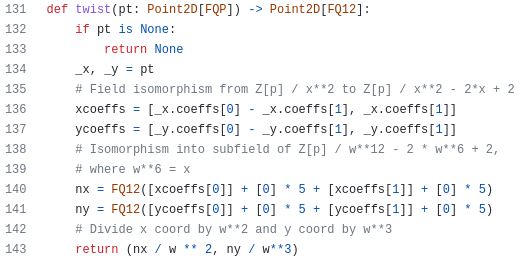
1. Thinking about this tweet lately. Here we have someone with a "tech people vs word people" dichotomy, but unlike @balajis and all the others who do this, crypto ends up on the side of... the word people.
This is not my image of what crypto is! So what's going on?
This is not my image of what crypto is! So what's going on?
https://twitter.com/tszzl/status/1473156331297120256
2. Here's the explainer on "wordcels vs shape rotators". If you're confused, read this first.
roonscape.substack.com/p/a-song-of-sh…
Now, back to the topic...
roonscape.substack.com/p/a-song-of-sh…
Now, back to the topic...
3. One important issue is that "crypto" means different things to different people.
To me, the core of "crypto" is the tech and mechanisms. ZK-SNARKs, BLS, auction models, x*y=k, quadratic funding... shape rotating all the way
Pairings literally use 12-dimensional curve twists!
To me, the core of "crypto" is the tech and mechanisms. ZK-SNARKs, BLS, auction models, x*y=k, quadratic funding... shape rotating all the way
Pairings literally use 12-dimensional curve twists!

4. But to many others, crypto means this:
palladiummag.com/2022/01/21/whe…
I do think high fees are a major culprit; they make interesting and cool apps too expensive so hyperfinancialized apps win out. I'm hopeful that successful scaling over the next 2y will fix this.
But anyway...
palladiummag.com/2022/01/21/whe…
I do think high fees are a major culprit; they make interesting and cool apps too expensive so hyperfinancialized apps win out. I'm hopeful that successful scaling over the next 2y will fix this.
But anyway...
5. There's also something deeper going on. Zeroing in now on the phrase "theorycel aesthetic sensibilities".
A lot of early crypto ideology was inspired by libertarianism, eg. Bastiat, Mises, Rothbard... which cares *a lot* about theorycel aesthetic vision of equality.
A lot of early crypto ideology was inspired by libertarianism, eg. Bastiat, Mises, Rothbard... which cares *a lot* about theorycel aesthetic vision of equality.
6. The core instinct is: we need a formal system of rights and limits that treats everyone equally and doesn't make unprincipled exceptions. You can't enslave or steal, so the government should not be able to enslave (conscription) or steal (taxation) either.
7. Crypto thinking about decentralization is similar. It's all about avoiding ugly unprincipled exceptions (in a centralized system, who gets to be the center?)
Focus is on proving hard unconditional security models (eg. secure unless >= 1/3 of stake is malicious)
Focus is on proving hard unconditional security models (eg. secure unless >= 1/3 of stake is malicious)
8. Meanwhile, AI is the exact opposite. It really does produce wonders, but we can't explain how it works, and there's far more unprincipled tinkering than theory.
And to be fair, the unprincipled approach does cause problems that crypto doesn't have!
christophm.github.io/interpretable-…
And to be fair, the unprincipled approach does cause problems that crypto doesn't have!
christophm.github.io/interpretable-…
9. One interesting parallel is @MacaesBruno's "black box" as a metaphor for how philosophy works in China, and why AI is attractive there. Very low on theorycel aesthetics, high on "just keep shape rotating until it seems to work"
brunomacaes.substack.com/p/the-black-bo…
politico.eu/blogs/the-comi…
brunomacaes.substack.com/p/the-black-bo…
politico.eu/blogs/the-comi…

10. To be clear, I think there are important good things that come out of taking theorycel aesthetics seriously, and people who don't suffer for it. A really big one is credible neutrality:
nakamoto.com/credible-neutr…
nakamoto.com/credible-neutr…
11. Theory is transparent and legible to outsiders, tinkering is opaque. Hence why crypto (the blockchains, not the applications on top of them) really has gained quite a bit of public trust, while AI has largely failed at achieving that goal.
12. And why I ultimately do think liberal democracies are much more well-suited to be the center of a "world order" than autocracies. A world where the center is a centralized black box is scary.
(But democracies do need to actually follow principles to keep their legitimacy)
(But democracies do need to actually follow principles to keep their legitimacy)
13. But crypto isn't just team theorycel. Crypto is certainly very theorycel compared to AI (and as I argue above, that's its *advantage*), but it also does a lot of shape rotation (which is crypto's advantage compared to much more purely wordcel-driven trad institutions)
14. So to summarize, I do think crypto is heavy on shape rotating and "crypto is theorycels who have accomplished nothing but scams" vastly undersells what crypto is situated to accomplish, but the crypto vs AI dichotomy also does point to something really important.
15. See also: Peter Thiel's idea that "crypto is libertarian, AI is communist"
inc.com/sonya-mann/thi…
inc.com/sonya-mann/thi…
16. It's fascinating how the two axes seem to imply each other:
Pure tinkering is fast and effective, but it is unprincipled, so lacks large-scale legitimacy, so can only cooperate through centralization
Theorycel thinking is slower, but well-suited for decentralization
Pure tinkering is fast and effective, but it is unprincipled, so lacks large-scale legitimacy, so can only cooperate through centralization
Theorycel thinking is slower, but well-suited for decentralization
17. BTW apparently the way noun declension works in this internet language is that if you respect someone being called a -cel, then the ending becomes -chad, so perhaps we should be talking about theorychads (and even wordchads)?
18. Many are inclined to dismiss this whole shape rotator and wordcel thing because it came from 4chan, and "everyone knows" 4chan is icky and hateful or whatever.
But I take it seriously. It's a new internet-native culture trying to understand the human world on its own terms.
But I take it seriously. It's a new internet-native culture trying to understand the human world on its own terms.
19. Perhaps even a lowbrow but still important part of the "post-liberal Western ideology" that @palladiummag keeps talking about. Not anti-liberal, but just... weird. Which is fine, because the underlying reality that it's trying to understand is weird and only getting weirder.
• • •
Missing some Tweet in this thread? You can try to
force a refresh






